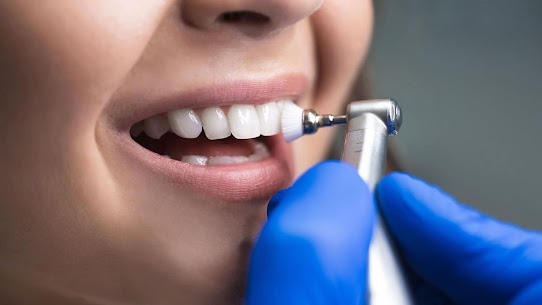Right Now
How Professional Teeth Cleaning Prevents Bigger Dental Problems
Maintaining good oral hygiene goes beyond just brushing and flossing daily. While these habits are essential, they don’t always remove all the plaque, tartar, and bacteria that build up over time. That’s where professional teeth cleaning comes into play. Regular visits to your dentist for teeth cleaning are key to preventing a wide range of dental issues, many of which can become severe if ignored.
In this blog, we’ll explain how professional teeth cleaning can protect your oral health, prevent complex dental problems, and save you from future pain and costly treatments.
What Is Professional Teeth Cleaning?
Professional teeth cleaning, often referred to as dental prophylaxis, is a preventive dental procedure carried out by a dentist or dental hygienist. It involves the removal of plaque (a sticky film of bacteria), tartar (hardened plaque), and surface stains from your teeth. The process typically includes:
Scaling to remove tartar from the tooth surfaces and below the gum line
Polishing to eliminate surface stains and smooth the teeth
Fluoride treatment (optional) to strengthen enamel and prevent decay
This procedure is usually recommended every six months, though some people may require more frequent cleanings depending on their dental health.
Why Brushing and Flossing Alone Aren’t Enough
Even the most thorough daily brushing and flossing routines can't fully eliminate plaque from all areas of the mouth. Plaque can harden into tartar in areas your toothbrush can’t reach, especially between teeth and under the gumline. Tartar is too tough to remove with regular brushing, and it can only be cleaned away with professional dental tools.
Over time, tartar buildup leads to inflammation, gum disease, cavities, and other complications. This is why professional cleanings are crucial—they act as a safety net, catching and addressing issues before they worsen.
How Professional Teeth Cleaning Prevents Bigger Problems
1. Prevents Gum Disease
Gum disease starts with gingivitis, which is inflammation of the gums caused by plaque and tartar buildup. If untreated, it can progress to periodontitis, a severe gum infection that damages the soft tissue and bone supporting your teeth.
Regular cleanings help remove plaque and tartar, preventing gum disease from taking hold or progressing. Your dentist can also identify early signs of gum issues and treat them promptly.
2. Reduces Risk of Tooth Decay
Plaque contains acid-producing bacteria that erode tooth enamel and cause cavities. Once enamel is worn down, teeth become more vulnerable to decay, sensitivity, and infection. Teeth cleaning removes plaque and helps preserve the enamel, reducing the likelihood of cavities.
3. Detects Early Signs of Oral Issues
During a cleaning session, your dentist checks for more than just plaque. They examine your mouth for signs of:
Cavities
Cracks or chips in teeth
Oral cancer
Gum recession
Signs of bruxism (teeth grinding)
Early detection allows for early treatment—often less invasive and more affordable than treating advanced issues.
4. Prevents Bad Breath (Halitosis)
Persistent bad breath is often caused by bacteria in the mouth, particularly on the tongue and between teeth. Professional cleaning eliminates these bacteria, promoting fresher breath and better oral hygiene.
5. Avoids Tooth Loss
Advanced gum disease and severe tooth decay are leading causes of tooth loss. Preventive cleanings help maintain healthy teeth and gums, significantly reducing the chances of losing a tooth due to infection or bone loss.
6. Saves Money in the Long Run
Preventive care, including regular cleanings, is far more cost-effective than treating complex dental problems. A routine cleaning is a small investment compared to the cost of fillings, root canals, crowns, or dental implants.
Who Should Get Professional Teeth Cleaning?
Everyone—regardless of age or dental history—benefits from professional teeth cleaning. It’s especially important for individuals who:
Smoke or use tobacco products
Have a history of gum disease or cavities
Have diabetes or other health conditions linked to oral health
Wear braces or dental appliances
Have poor oral hygiene habits
Children, adults, and seniors alike should make teeth cleaning a regular part of their health routine.
What to Expect During a Cleaning
A standard professional teeth cleaning typically involves:
Examination: Your dentist examines your teeth and gums for signs of inflammation, decay, or other issues.
Scaling: Tartar and plaque are removed using ultrasonic instruments and hand tools.
Polishing: A gritty polish is used to smooth and shine your teeth.
Flossing: Your dentist flosses between your teeth to ensure no debris remains.
Rinsing: You rinse your mouth to wash away any remaining particles.
Post-care tips: Your dentist may recommend oral care products or lifestyle changes for better results.
The process is painless for most people, though there may be slight sensitivity if there is excessive tartar buildup or gum inflammation.
Professional teeth cleaning is one of the most important steps you can take to maintain a healthy mouth and prevent more serious dental issues. It not only supports your daily oral care routine but also allows dental professionals to catch and address problems early on. If you’re looking for affordable teeth cleaning in Chandkheda Ahmedabad, DANTBATRISA – The Family Dentist offers expert care tailored to your needs. Our team ensures thorough cleaning while keeping your comfort and long-term oral health in focus.
Whether it’s protecting against gum disease, reducing your risk of cavities, or simply enjoying fresher breath and a brighter smile, regular cleanings are essential.
So, the next time you’re tempted to skip your dental appointment, remember that a quick cleaning today can prevent major problems tomorrow.
More Posts
Report This Post
Please complete the following requested information to flag this post and report abuse, or offensive content. Your report will be reviewed within 24 hours. We will take appropriate action as described in Findit terms of use.















